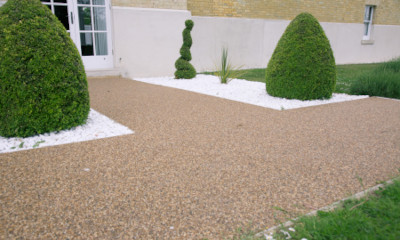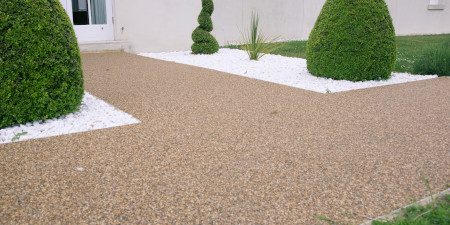
When it comes to enhancing the aesthetics and functionality of outdoor spaces, resin surfaces have emerged as a popular choice for homeowners and businesses alike. Resin bound and resin bonded surfaces offer unique advantages that can transform driveways, pathways, and other areas into stunning and durable landscapes. As a reputable UK surfacing installer, we can tell you that understanding the strengths and considerations of each option is crucial if you want to make an informed decision for your project.
Resin bound surfaces: where elegance meets durability
Resin bound surfaces are a seamless blend of natural aggregates and clear resin, resulting in a visually appealing finish that’s not only charming but also highly durable. Here are some key strengths of resin bound surfaces:
Aesthetic appeal
Resin bound surfaces create a smooth, natural-looking finish that can be customised with a wide variety of aggregate colours and sizes. This flexibility allows homeowners to match their chosen aesthetic while enhancing kerb appeal.
Permeability
One of the standout features of resin bound surfaces is their permeability. Rainwater can easily drain through the surface, reducing puddling and eliminating the need for additional drainage systems. This makes them compliant with Sustainable Urban Drainage Systems (SUDS) regulations.
Durability
Resin bound surfaces are resilient to heavy foot traffic and vehicle loads, making them an ideal choice for driveways, pathways, and other high-traffic areas. The seamless nature of the surface also reduces the risk of weed growth.
Low maintenance
With minimal joints or seams to worry about, resin bound surfaces require little maintenance. Regular cleaning is usually enough to keep the surface looking pristine, and the use of UV-stable resins ensures that the colours remain vibrant over time.
However, there are certain considerations to keep in mind before recommending a resin bound surface:
Installation complexity
Proper installation requires a skilled workforce, as it involves mixing the aggregates and resin on-site and then trowelling the mixture evenly. Ensuring proper installation is crucial to achieving a long-lasting, attractive finish.
Curing time
Resin bound surfaces require adequate curing time before they can bear heavy loads. You’ll need to think about the time that’s required before the newly surfaced area can be used as intended.
Resin bonded surfaces: a balance of beauty and traction
Resin bonded surfaces consist of a layer of resin that is applied to a prepared surface, followed by a scattering of aggregates. These surfaces offer their own set of advantages:
Anti-slip properties
Resin bonded surfaces provide excellent traction due to the exposed aggregate particles. This makes them a suitable choice for areas where slip-resistance is a priority, such as sloping driveways or walkways.
Quick installation
Compared to resin bound surfaces, resin bonded surfaces have a quicker installation process. The surface is ready for use shortly after installation, making it a convenient choice if you are looking for a fast turnaround.
Cost-effective
Resin bonded surfaces tend to be more budget-friendly than resin bound surfaces, making them a viable option if you have a tighter budget and want to make the most of your money.
There are limitations to resin bonded surfaces that you should bear in mind:
Water permeability
Resin bonded surfaces are not permeable like resin bound surfaces are. Proper drainage must be considered during installation to prevent water pooling.
Longevity and maintenance
While resin bonded surfaces are durable, the bonded layer may eventually wear down over time, requiring reapplication. Additionally, some maintenance may be needed to address loose aggregate particles.
How to choose the right option for your requirements
Intended use
It’s important to keep the primary purpose of the area in mind. Resin bound surfaces are excellent for driveways, pathways, and patios, whereas resin bonded surfaces are better suited for pedestrian areas and decorative surfaces.
Budget
We appreciate that this is a given, but budget is always an important deciding factor. Resin bonded surfaces offer a more cost-effective solution, while resin bound surfaces provide a slightly more luxurious finish.
Aesthetic preferences
Make sure you can achieve your desired look and colour scheme with the resin surface you choose. Resin bound surfaces offer greater customisation options in terms of colour and texture.
Drainage
If proper drainage is a concern, resin bound surfaces are the better choice due to their permeability. If you live in a built-up area without many open green spaces nearby, having a permeable driveway is the best way to avoid standing water and surface water runoff.
Are you interested in adding a resin surface to your property? The experts at Limegate Specialist Surfacing will be happy to answer any questions you may have and to provide the high-quality installation you deserve. Give us a call on 01959 546 208 to get started.

Contact Limegate
Want to find out more about FeRFA? We will be happy to offer advice. Call 01959 546 208 or email to ask us any questions about our services.


